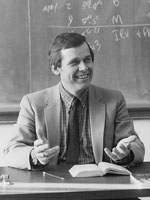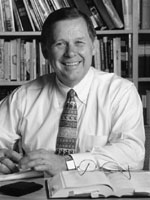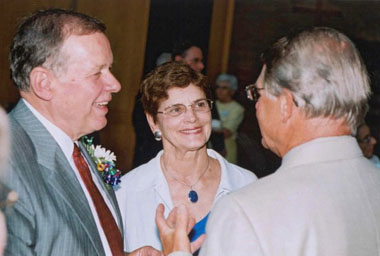 |
David Tiede teaching in 1987. After retiring from Luther Seminary, he will continue his New Testament scholarship as the Bernhard M. Christensen Professor of Religion at Augsburg College.
ALL PHOTOS COURTESY LUTHER SEMINARY |
I took copies of all of the board reports and dashboards for the past 18 years on my week-long study leave in February and experienced several hours of wonderful, complex, and sometimes painful reading. The pain was sharpest around several personnel crises we experienced in the 1990s. The cumulative progress was encouraging in almost all areas, although we are just now recovering from the decline in full-time enrollment that began in the 1990s. The complexity reflected our continuing efforts to improve our service to the church. We certainly have not accomplished all the church needs from us, but we are discerning the path.
To the boards
Reading the board reports revealed many things, not least how much all of us have invested over time in developing effective governance. President David Hubbard at Fuller told us that he invested half of his time in their board. We were stunned, dubious. As it turns out, David Hubbard had strategic wisdom, and all the engagement and responsiveness we have pursued with our boards has yielded remarkable returns, especially in the efforts to call the right people on our boards. The Leadership Committee is ready to guide the new president in this work.
To the faculty
Only jokes about lawyers and deans are more numerous than shots at faculty meetings. Some are funny. When Henry Kissinger returned to Harvard from being secretary of state, he said, "The rancor in faculty meetings is so fierce because the stakes are so low!" Having missed only one of our approximately 175 faculty meetings in the past 18 years, I can recall low points. These things happen in strong faculties. Most arguments are worth having, if they are clean. The truth is that the Luther Seminary faculty does superb work. Even faculty meetings are increasingly competent and worthy of the faculty's calling to lead the seminary's educational mission. Deliberation has become better as it anticipates future legislation without false immediacy in decisions.
In fact, the stakes are high. Our mission is education in service of the Gospel. The most powerful thing that happens at Luther Seminary is teaching and learning. The remarkable educational venture on which Luther Seminary has embarked requires constant vigilance in each faculty search, the evaluations of learning results, and the allocation of resources.
To the administrative cabinet
The competence, commitment, and collegiality of the members of the Luther Seminary cabinet are immense blessings to the seminary.
We are an engaged, sometimes argumentative group. No one has their arena of leadership just to themselves. These are my closest colleagues. I am deeply indebted to each, as are the boards and the whole seminary. I will miss them all dearly.
The students and seminary community
My thanksgiving for the students I was long privileged to teach has an annual outlet in welcoming prospective students, participating in First Week with the new classes, speaking at convocation, and presiding at commencement. I have long said, "Teaching at Luther Seminary is good work, if you can get it." The president is privileged to help hold all of it together.
Daily chapel. Preaching and presiding hundreds of times over the years. Weekly discipleship groups. Speaking at or hosting the President's Forum at every midwinter convocation and each annual gathering of the Partners and the Heritage Society. Bible studies with the Society of Stewards. Helping design and stage at least 12 Leadership Circle retreats. Attending every faculty retreat. Hosting faculty and staff receptions in our home. Faculty-staff Christmas parties and spring dinners for the faculty, staff, and emeriti. Welcoming guests and annual lecturers. Writing for Story and devotionals. Conducting countless presidential briefings with wonderful people who visit the seminary. How grateful can a president be?
 |
The Rev. David Tiede retired this year after 18 years as president of Luther Seminary. During his tenure, the Evangelical Lutheran Church in America was formed from the merger of three Lutheran synods, and Luther Seminary became the largest theological school in the new denomination.
|
|
The seminary's publics
One of our goals in the fall of 1987, when the ELCA was about to be launched, was to make the campus a more public place and to strengthen the seminary's public role. With the departure of the national offices of the American Lutheran Church, we were eager to welcome the ELCA Region III offices, invite Lutheran Social Service to lease land to build on our campus, move the bookstore to a more public location, improve the seminary's signage and logo — and even simplify its name. All these steps assisted our public mission.
As it turned out, the presidency of Luther Seminary also proved to have durable value for convening other institutions of the church and their leaders. I have regularly been invited to speak in the synods, seminaries, and institutions of the church. In the company of the other presidents, I have attended every churchwide assembly since the ELCA began and have never missed a gathering of the Conference of Seminary Presidents. Even in the early 1990s, when Luther Seminary was criticized by the Lutheran and others for being less than supportive of the national organization, we were not marginalized. Many churchwide leaders worked with us through those years.
All along, we have been blessed by strong leadership in the Division for Ministry. Bishop Hanson has met annually with the Conference of Seminary Presidents. We are blessed.
The "Faith in the City" initiative was formed with Augsburg College, Augsburg Fortress Publishers, Central Lutheran Church, Lutheran Social Services, Fairview Health Systems, Thrivent Financial for Lutherans, and Luther Seminary. Several remarkable projects have ensued, including the Minnesota Faith and Health Consortium with the University of Minnesota and the Minnesota Consortium of Theological Schools. Our long-standing engagement in Jewish-Christian dialogue has also advanced nicely in recent years.
All of these connections take time, but the campus has become a more public place and the seminary has been learning (and perhaps teaching its students) a public role. Again and again Luther Seminary — its faculty, students, and president — has been drawn into arenas of public service and engagement with institutions far beyond our scale.
I am grateful for the ways our lay leaders are teaching Luther Seminary to be public.
What if our graduates had trusted friends to draw them into such public engagements?
The seminary's supporters
Presidents spend much of their time saying "thank you" to generous people. This has proven to be a more joyful experience than I could have imagined. My gratitude is sincere and personal. When I review the more than $200 million that has been given to this seminary by people of the church in the past 18 years, I am simply awed by the donors' care for the future of the church and their love of God. This is the stuff of callings, right along with the students who come and are sent forth with stories of suffering and joy.
And we are privileged to step on the holy ground of people's lives, to hear how their hard work has been blessed with abundance and what they believe God has called them to make of it and why they want Luther Seminary to be the best it can possibly be. And those people are you. I am awed, grateful to you, and thankful to God for you.
==========================================================================
In Trust asked David Tiede about some of his influences.
Who have been your mentors?
In the early years of my presidency I was surprised to discover my need for several new kinds of mentors. I was soon attracted to experienced scholar-presidents such as Dr. David Hubbard at Fuller and Dr. Vincent Cushing at Washington Theological Union. They had led their institutions well and kept their theological minds alive.
Then I began to realize my need for the profound wisdom of several of my board members, especially the chairs. The annual review and goal setting processes became tutorials in professional improvement, recognizing the board's role both in authorizing my leadership and in holding the school and me accountable to accomplish what we agreed was needed. In this bond of trust, the board chairs became my mentors and friends as well as my bosses.
What writers have been your sources of guidance?
I have found spiritual strength both in Paul's wisdom about the body of Christ and in various contemporary interpreters of leadership. Paul was adapting a civic metaphor of the "body politic" to speak of the harmony in the community when the diverse gifts of all its members are welcomed. When Peter Senge, in The Fifth Discipline, speaks of the change of mind or metanoia that is required for a shared vision, he is using the New Testament word for "repentance" or "conversion." And in Leadership on the Line, Ron Heifetz respects the courage and even the suffering required of leaders during profound or "adaptive" change. And Jim Collins's presentation in Good to Great of "Level Five Leadership" defies illusions of perfection.
 |
| At his retirement party, David Tiede and his wife, Muffy, were greeted by dozens of supporters. |
Can you think of a time when the various elements of seminary governance were working in harmony?
Governance is the stewardship of powers to accomplish the seminary's mission, and the president stands in the nexus of differing powers. This means guarding and insisting upon the faculty's responsibility for teaching and learning, managing the institution's resources for the sake of this work, and calling upon and serving the convictions and capacities of the board and constituency to define the school's educational goals publicly and to provide the resources to accomplish them.
Governance is an agony when the diverse powers are in conflict. Governance is almost an ecstasy when a strategic plan articulates a shared vision putting the powers in alignment. The day the boards and the faculty both agreed to order their meeting times to deliberate more and legislate less, I sensed we had improved our chances for the differing powers to spend their time discerning how best to accomplish the work instead of preventing someone else from interfering.